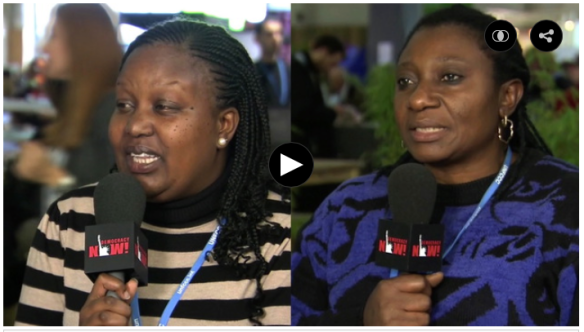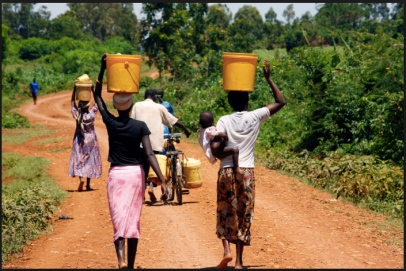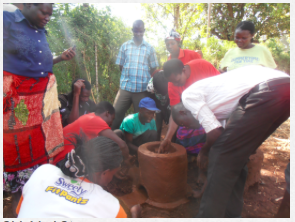
Edna Kaptoyo and Priscilla Achakpa discuss the importance of African women’s voices at COP21. See full video here.
In the video above, Priscilla Achakpa of Nigeria and Edna Kaptoyo of Kenya discuss the importance of African women’s involvement in the Paris Climate Change Conference given the disproportionate effect that climate change has on women in developing countries. Achakpa and Kaptoyo explain that in rural communities, women are the main source of labor in a family. This means that the woman is responsible for collecting water and firewood for the household, along with completing other agricultural and household tasks. When lakes dry up as a result of climate change, it is women who are expected to walk to the extra distance to the next available water source. This can prove to be a dangerous and grueling task.

“Women in Nyanza province, Kenya, walk each day to collect water for drinking and cleaning.” Photo by Peter Bregg.
Given the disproportionate effect of climate change on such populations, Achakpa and Kaptoyo argue that it is essential for these women to be brought to the table and to have a voice in the conversations happening now in Paris at COP21. For those of us living in cities, we generally do not feel the effects of climate change on a day to day basis in the same way that these pastoral communities do. In order for governments and other powers-that-be to make appropriate and effective policy decisions in regards to climate change, these women must be given the opportunity to educate these decision makers on the realities and needs of those most effected.
Many nonprofits have recognized this reality for women in rural areas and have targeted them for educational programming regarding how they can change their behavior in response to environmental issues. For example, an environmental group in Uganda, JEEP (Joint Energy and Environment Projects), teaches women to construct cooking stoves that require less firewood and diverts the smoke so that it is not collected in the home.

One JEEP stove model.
This is an effort to reduce deforestation and air pollution. While these are both very important goals and this project, and others like it, has the potential to positively impact many lives, it is asking these women to take responsibility for climate change in a way that developed countries (those most responsible for the devastation of the environment globally) have so far refused to take. At the same time, these voices are being excluded from the conversations that have the potential to generate change on a larger scale. If those participating in the Paris Conference are serious about addressing the climate-related issues facing our world today, not only should they think about how they can change the behavior of those most effected by environmental changes, but they should also seek to educate themselves in what the needs are in these communities as identified by the women who feel the effects the most. As the most qualified educators on this topic, African women must be given a seat at the table.
Sources:
Abubakari, Fariya. Paris walks, as Africa burns, developed countries must support Africa. Ghana Web. 6 December 2015. http://www.ghanaweb.com/GhanaHomePage/features/Paris-walks-as-Africa-burns-developed-countries-must-support-Africa-398801
African Development Bank Group. AfDB to Support Electricity Access for All By 2030 With African Renewable Energy Initiative. All Africa. 2 December 2015. http://allafrica.com/stories/201512041743.html
Daniel, Ari and Schachter, Aaron. Clean cookstoves protect women and the environment. KBJA Mid-Missouri Public Radio. 3 December 2015. http://kbia.org/post/clean-cookstoves-protect-women-and-environment
Davenport, Coral. Trust and Money at Core of Crucial Paris Talks on Climate Change. The New York Times. 6 December 2015. http://www.nytimes.com/2015/12/07/world/europe/trust-and-money-at-core-of-crucial-paris-talks-on-climate-change.html?_r=0
Goodman, Amy. African Women, Hit Hardest by Climate Change, Forge New Solutions Across the Continent. Democracy Now. 4 December 2015. http://www.democracynow.org/2015/12/4/african_women_hit_hardest_by_climate

Rachel, I love your argument on hearing African women’s voice in climate change. Your post brings women, globalization and climate change together, which I have not thought about that before. Climate change affect everyone’s life to some extent, but for women in Kenya it means more labor work and more dangers. I am curious about how African women could be brought into the conversation fair and square. And are they aware of the situation they are trapped in?
LikeLike